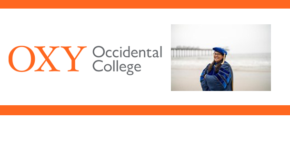 On Occidental College Week: Foreign aid can change political behavior in the country receiving it.
On Occidental College Week: Foreign aid can change political behavior in the country receiving it.
Syeda ShahBano Ijaz, assistant professor of global political economy, diplomacy & world affairs, details how.
Syeda ShahBano Ijaz is a scholar of the political economy of development with a regional focus on South Asia. Her research, teaching, and public scholarship is situated at the cusp of international and comparative politics: she is most interested in the domestic consequences of foreign aid and its impact on the political behavior of aid recipients in the global south. In 2023, she received a Ph.D. in Political Science from the University of California at San Diego (UCSD). Before joining UCSD, she completed an M.A. in Politics from New York University and an M.Sc. in Economics for Development from the University of Oxford as a Commonwealth Scholar. At Occidental College, she teaches courses on international development, globalization, foreign aid, and democratic processes in South Asia.
How Foreign Aid Changes Political Behavior
Foreign aid comprises one of the largest movements of money across national borders. From supporting military technology to sustaining development initiatives, it is a key tool used by countries of the Global North to meet their strategic objectives. Since most foreign aid is sourced through tax-payer money, developed country governments sell it to the public as money that benefits developing country citizens. You are probably familiar with images of starving children – mostly non-white – eager to receive packets of aid stamped with ‘USAID’ or ‘World Bank’ logos. Or with Bill Gates’ efforts to reinvent public toilets in India amidst a human waste crisis.
But when foreign aid is used to provide public goods, often in partnership with local non-governmental organizations or NGOs, it assumes the role of a parallel state. Political scientists are, therefore, concerned that foreign aid-funded provision of public goods will damage the citizen-state contract and reduce the legitimacy of local political actors. Yet, recipients at the other end of the foreign aid transfer chain are just as strategic as the donors and have the agency to alter their political behavior.
I study a subset of such aid recipients in Pakistan comprising citizens who are eligible to receive a quarterly cash transfer from the country’s largest social safety net: the Benazir Income Support Program. Even though this transfer is funded by foreign aid, local elected officials remain relevant. It is these local elected officials who provide the facilitative services – such as filling out necessary forms or providing transportation to cash points – that recipients need to successfully access foreign aid benefits. When recipients face cumbersome bureaucratic procedures in trying to enter the fold of foreign aid programs, they turn to their elected representatives for support. These representatives, otherwise strapped for resources, offer facilitative last-mile access to foreign aid in order to gain votes. Foreign aid-funded public programs can therefore spur a robust political exchange around last-mile access to benefits, and bolster citizen-state relations instead of damaging them. All this requires is a reimagination of developing country citizens, from passive recipients to strategic political agents.

